- FOKION AVGERINOS – DR. IKE: Athletic Director, Youth Mentor, and Healer
- American Hellenic Institute’s Golden Jubilee Celebration
- Leadership 100 Concludes 33rd Annual Conference in Naples, Florida
- Louie Psihoyos latest doc-series shocks the medical community The Oscar–winning director talks to NEO
- Meet Sam Vartholomeos: Greek-American actor
JOHN G. RANGOS, SR: CHANGING THE LANDSCAPE OF AMERICA – A kid from a steel town cleans up America and spreads his charity to all

John G. Rangos Sr.
John Rangos learned several things growing up during the Depression in a steel town like Weirton, West Virginia: he learned about the pluck of people like his mother Anna Rizakus who talked herself into a job at the local steel mill to support her family; he learned about how the whole town lived and died on the fortunes (and pollution) of that same steel mill; and he learned firsthand about the philanthropy of the man who built the mill, but also built most of the town.
“I remember E.T. Weir as an extremely wealthy man, but who was very benevolent to the people of Weirton and who built the parks, schools, libraries, and swimming pools I used as a kid,” says Rangos, now 87, who not only went on to become the pioneer in processing the industrial waste of towns just like Weirton and whole metropolises like New York City, but also one of the most generous philanthropists in America.
His Rangos Family Charitable Foundation is a mainstay of medical research at Children’s Hospital in Pittsburgh with its own multi-story research center; its own school of health at Duquesne University (with a chair in health sciences and ethics named after Anna Rizakus); its own life sciences building at Johns Hopkins University, and through the efforts of the foundation, various partnerships of leading universities in Greece with Johns Hopkins and Carnegie Mellon University.
And among the endless list of his other charities, John Rangos is founder of the International Orthodox Christian Charities (IOCC).
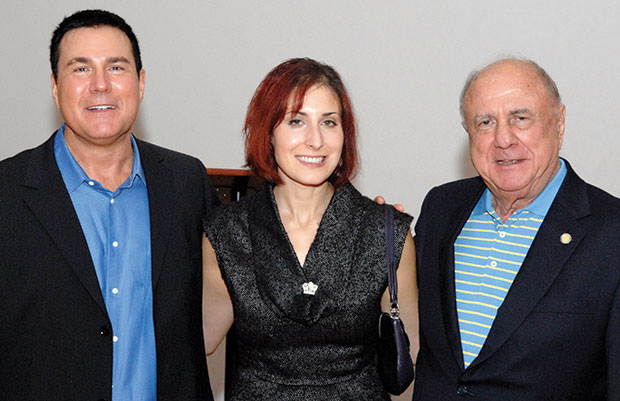
John G. Rangos Sr., right, with his son Alex and daughter Jenica.
“When the farmers in Greece could no longer feed their livestock after wildfires in 2007 left pastures across the Peloponnese in ruins, John Rangos was there, on the charred hillsides, by my side, ready to buy fodder and help families get back on their feet,” says Constantine Triantafilou, CEO and Executive Director of IOCC. “Years later, he was also the first with a financial gift to jump start IOCC’s grocery voucher card program that is providing fresh food to thousands of impoverished families in Greece…John Rangos is much more than a visionary who co-founded IOCC in 1992, (he is) a first responder, repeatedly leading the way over the past 25 years with both financial and moral support for the organization’s responses to humanitarian crises.”
And in business over sixty years John Rangos has literally transformed the environmental landscape of America forever.
He was 24 and just out of the Army when he was interviewed for his first career job at Rockwell Manufacturing by Colonel Rockwell himself and his top executives C.K. Madison and Jay Northcut.
“They offered me a regular job and I said no,” he recalls. “You have to pay me for what I sell. If I don’t produce anything you don’t have to pay me a nickel. After looking over my plans, the vice president there, C.K. Madison, he called me Sonny Boy, he said to me, ‘Sonny Boy, either you’re a genius or you’re crazy, but we’ll bet on you.’”
Lucky they did, because as general agent for Rockwell he made them millions, and also by age thirty had made a fortune for himself which he parlayed into three companies of his own.
“And I was just a kid,” he still marvels.
He did it by looking at the industrial landscape of America in places like Weirton and seeing the future: how the refuse of industry would blight that landscape if nothing was done and how something could be done in new and ingenious ways that would literally create a whole environmental industry.
“I saw opportunities,” he says simply.
He took the mountains of coke ash left over by the steel mills in places like Weirton and determined it could be used for skid-resistant surfaces during Eisenhower’s highway-building boom of the 50s and for cinder block in the house-building boom of places like Levittown, New York.
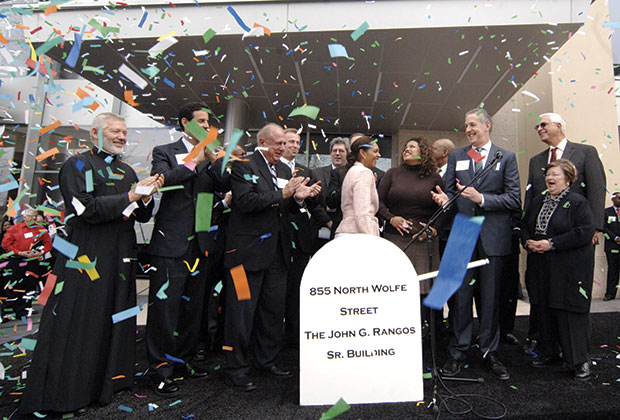
Confetti rains moments after the inauguration of the new John G. Rangos Sr. Life Sciences Building at Johns Hopkins University Science & Technology Park, part of an 80-acre urban development just north of the Hopkins medical campus in east Baltimore. The Rangos Family Charitable Foundation funded construction for the building. Pictured from the left are His Eminence Metropolitan Soterios of Toronto, a cousin of Mr. Rangos; Congressman John Sarbanes of Maryland; Mr. Rangos; Baltimore Mayor Sheila Dixon and City Council President Stephanie Rawlings-Blake; Scott Levitan, director of development for the new Science & Technology Park; Edward D. Miller, Dean of Johns Hopkins School of Medicine; and U.S. Senator Barbara Mikulski of Maryland.
He took something called fly ash (a residue of smokestacks) and turned it into something he patented as pozzolan, which helps to make concrete and plaster set, which coats metal screens, and which is now used in everything from kitchen counter tops, to bowling balls, to boats hulls, to cosmetics, to toothpaste, to ceiling tiles, to boat bulls, to picture frames and tool handles and roofing tiles.
And literally scraping the bottom of the barrel, he took boiler ash and slag from the bottom of coal-burning furnaces at power plants and turned it into cinder block and roadway anti-skid material.
“I went to the big chemical companies like DuPont and Dow and told them about this and with their boatload of engineers none of them had ever thought about something like this,” he says. “So I created a whole new market for them.” (Specifically, silicone screens now used in many products and for industrial purposes.)
Expanding his thinking through several more companies (and buying up his competitors until he became the biggest) and eventually working with his sons John Jr. and Alexander, he also started thinking of ways to store and dispose waste that could be not be converted even by him into usable product.
“I said to myself the next big movement in America is going to be the disposal of municipal and industrial waste,” he says.
“And if you can build the receptacles right you can become the giant in the industry.”
So in less than a year he bought three companies that did the work and got in the business big-time in hauling and safely storing the unseemly by-product of the municipal waste of cities as big as New York City.
And the company got such a spotless reputation (in such a messy industry) that when environmental hawk and notoriously-hard-nosed Florida and later national EPA administrator Carol Browner approved his company to build the landfill in Florida’s environmentally-sensitive Okeechobee County she called him in and told him why: “Mr. Rangos, it’s hard for me to believe that somebody could have a record that good.”
Based on that record, the company got the permit (“The only permit ever given in the whole history of the Eastern United States,” he says proudly) and another to build a landfill in Charles City, South Carolina which transformed the town much as Weirton had been transformed by Ernest Weir.
“Charles City was financially depressed and after we got done giving them millions in tax revenue and jobs they were able to build new schools, new roads, new everything,” Rangos says, his career now come full circle.
And now as he reflects on his life from his retirement in Florida (his assistant of 25 years, Nancy Barnhart, still comes in three times a week–“I’m still very active in the market,” he admits) he thinks the people who influenced him the most growing up in Weirton, West Virginia during the Depression would now be proud—starting with his papou Kostis Svokas, the sea captain from Chios.
“My grandfather was probably as straight a man and as tough a disciplinarian as I would ever know but I loved that old man,” he says. “He made me into the man I am.”
Papou Kosti left being a captain for Livanos Shipping and came to Weirton and got into the restaurant business. When the Depression came and the restaurant folded he started working at Weirton Steel. He was the one who put ten-year-old John on a soda crate to see FDR give a speech.
When his parents got divorced, his mother went to Weirton Steel and talked herself into eventually becoming the first woman tin inspector at the mill.
“My mother had the courage to do what few women did at the time,” her son says. “She went there and volunteered to work for two weeks for nothing until they hired her (sound familiar?).”
There was also his uncle John Rangos, who had one of the largest beer distributorships serving Ohio, West Virginia and Pennsylvania, and Rangos worked summers with his father Gus at his restaurant in Fredericksburg, Virginia, the Palm’s Grill.
“My father was a very brilliant man,” says his son. “If you ask anybody in Fredericksburg, they’ll tell you old man Rangos was a very successful man. He was one of the most successful restauranteurs down there in Fredericksburg. He wanted me to take over his restaurant and I said, Dad, I’ve been in the restaurant business all my life and I think I’m tired of it. Well, what are you going to do? he said. I said I’ll figure something out.”
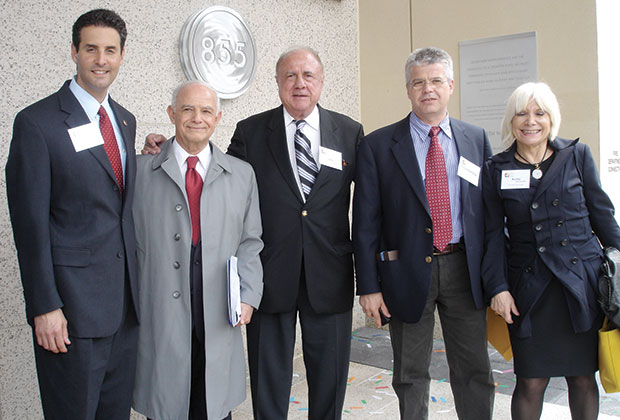
(L-R) Congressman John Sarbanes of Maryland; Prof. Vassilios Makios, general director of Hellenic Technology Clusters Initiative; leading Greek American industrialist and philanthropist John G. Rangos; Prof. Charalambos Gogos, professor of Medicine at the University of Patras; and Ioanna-Annita Mavromichalis, representing the Greek Embassy in Washington, stand in front of the Rangos Building at Johns Hopkins University.
He was going to Houston Business College and working nights at Kelly’s Steakhouse right across the street from the fabled Rice Hotel when his mother got very sick, and being an only child, Rangos went back to Weirton to take care of her. That’s when the Korean War broke out and he promptly enlisted in the Pennsylvania National Guard, stationed in Pittsburgh—“which was supposed to be active; that’s why I joined it.”
But it wasn’t, so he was given the option of becoming a first lieutenant for six years in the Air Force and being stationed in Greenland.
That didn’t let him see action, either, so he joined the regular Army for two years in 1952 and went first to Combat Signal School at Fort Gordon and then to Korea in a combat signal unit.
He came home so changed that his mother didn’t recognize him when he got off the troop train in San Francisco. “Who are you looking for?” he asked her. “Do you know Johnny Rangos?” she said. “Let me see if I can find him,” he told her, before he reintroduced himself to her. “Ante re paliopaido!” she told him.
As part of his renewed commitment to the country he also got involved in politics—on his own terms.
“I’m active in politics as a good citizen and I’ve never asked a politician for anything,” he says. “To me if they did a good job they paid me back.”
He had the signal honor to have his own parish priest ask him to preside over the invocation and benediction broadcast all over the world at the retirement of President Eisenhower.
And because he was such an effective campaigner for political kingmaker Mayor David Lawrence of Pittsburgh he was tapped by JFK to join his 1960 presidential campaign, and Rangos joined JFK on the trail and won him Pennsylvania, Maryland and West Virginia.
Later he met Bobby Kennedy, who asked him to do the same for his own 1968 presidential bid, tragically cut short. And Rangos has also advised Senator Ted Kennedy, and he became personal friends and a close advisor to Senator Hugh Scott of Pennsylvania, the Senate minority leader.
And seeing history up close, he was the man on the ground in Athens during the Turkish invasion of Cyprus and the one who visited the American embassy almost daily to report directly to the White House on the situation through liaison Gene Cowan.
Hoping to give back to Greece even further, in the early 1990s he tried to distill his wisdom and give Greece a master plan to meet its environmental challenges after talking to Prime Minister Mitsotakis.
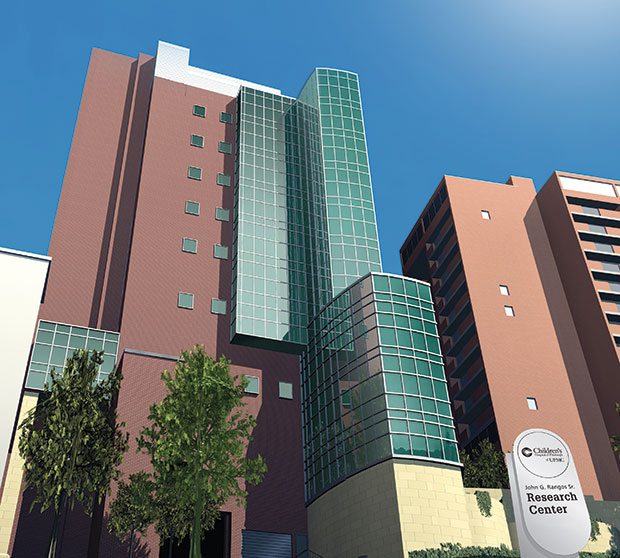
The new Rangos Research Center at Children’s Hospital of Pittsburgh will help meet the city’s growing demand for more research space.
“I told the prime minister that Greece is the most beautiful country in Europe, and that it was just a crying shame to let pollution denigrate that beauty,” he says. “He told me Greece was having a hard time finding a solution to that problem, so I offered the company’s services, pro-bono. And I kept my promise. I had 30 engineers working there for nearly a year-and-a-half and the plan we offered them was bound in a book two-inch thick.”
The plan did save the country millions, but it could have saved it billions, except the government fell and the plan was shelved, although bright minds in Greece and all over Europe are still applying many of its solutions.
In his retirement, like a lion in winter, Rangos now burns out family and his assistants running his John G. Rangos Sr. Family Charitable Foundation (“They ask them: how is the old man doing in retirement? And they say, what retirement?”).
The Foundation has founded or funded everything from the Congressional Medal of Honor Foundation to support the activities of living Medal of Honor recipients (Rangos was asked to speak to the VFW national convention right before President Obama and says, “There is no greater honor than to be honored by your fellow warriors”); to coordinating the Information Networking Cooperative Exchange with the Athens Institute of Technology, a master’s of science program in Greece through CMU; to funding the Rangos Family Foundation Building at St. Vladimir’s Orthodox Theological Seminary (Rangos is part-Russian: “The Rangos family was an important family in Russia for many years.”).
And like a lion in winter he finally has the time to enjoy his family (he has a daughter Jenica and four grandchildren).
“I’m a very happy family man, the kids are doing well,” he says. “Even though sometimes an overworked businessman is not the best family man; which is why I got divorced twice. You give most of your time to the business. One thing I know is that I was a very good provider and I always kept my word and that’s all you can do and hope for the best.”
He says many times in his life he told God, give me an easy one.
“But I’ve always been true to my motto,” he says. “If you make mistakes, swallow the mistakes, admit them, and you’ll feel better about yourself. That’s been my motto.”

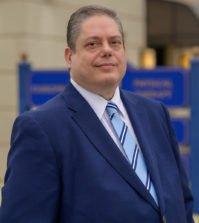
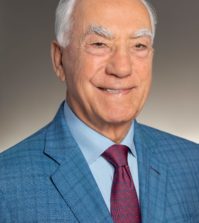
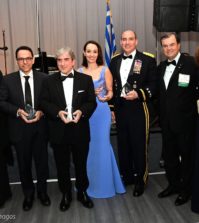
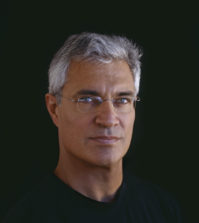










0 comments